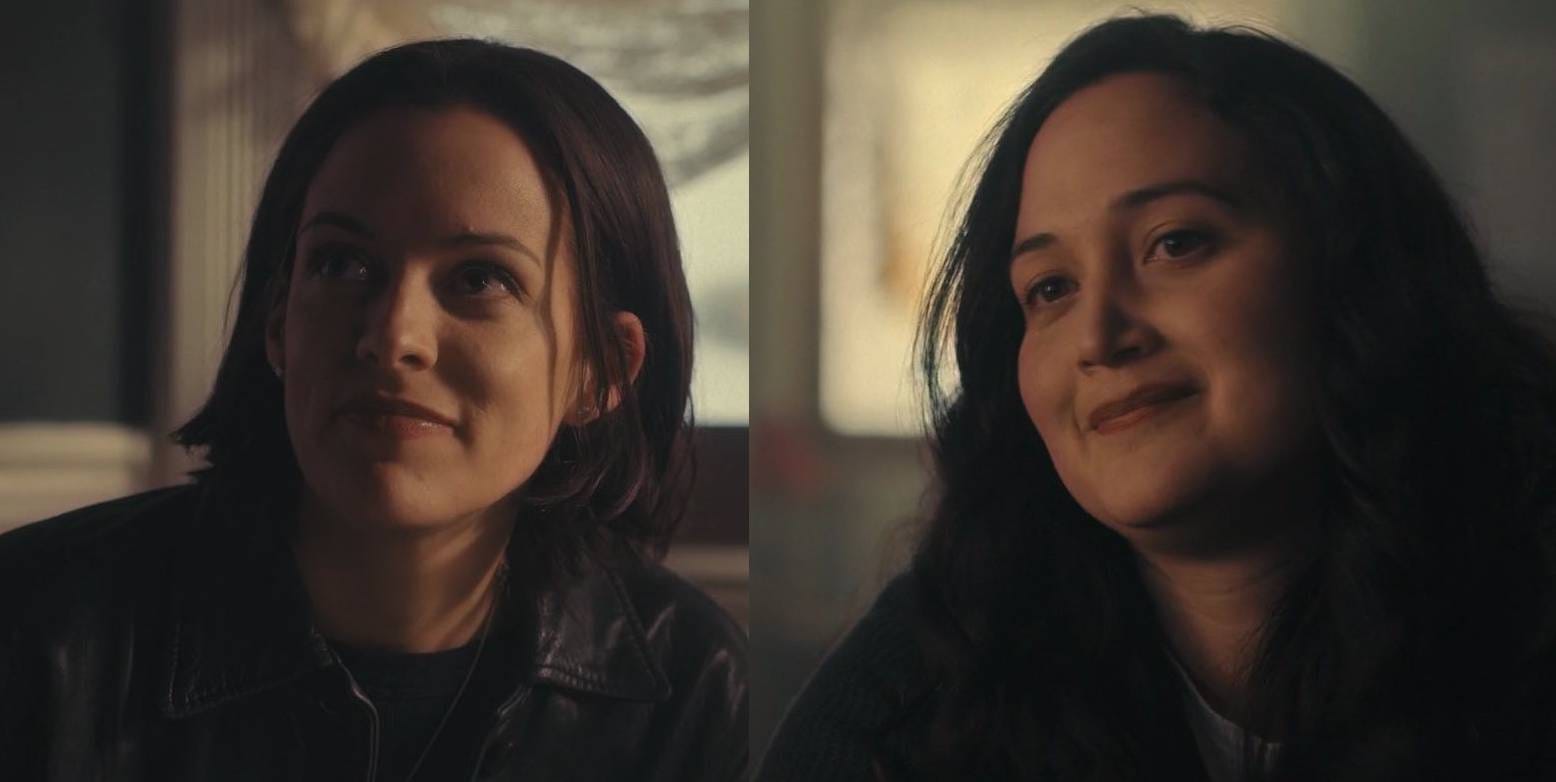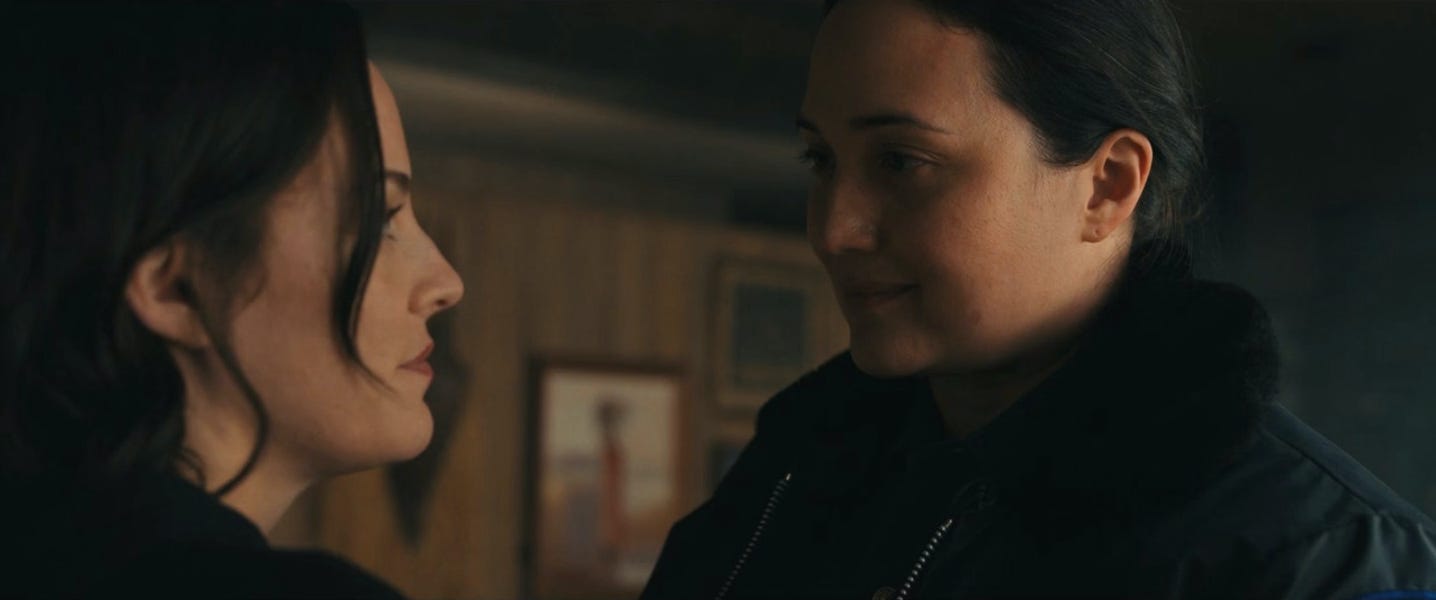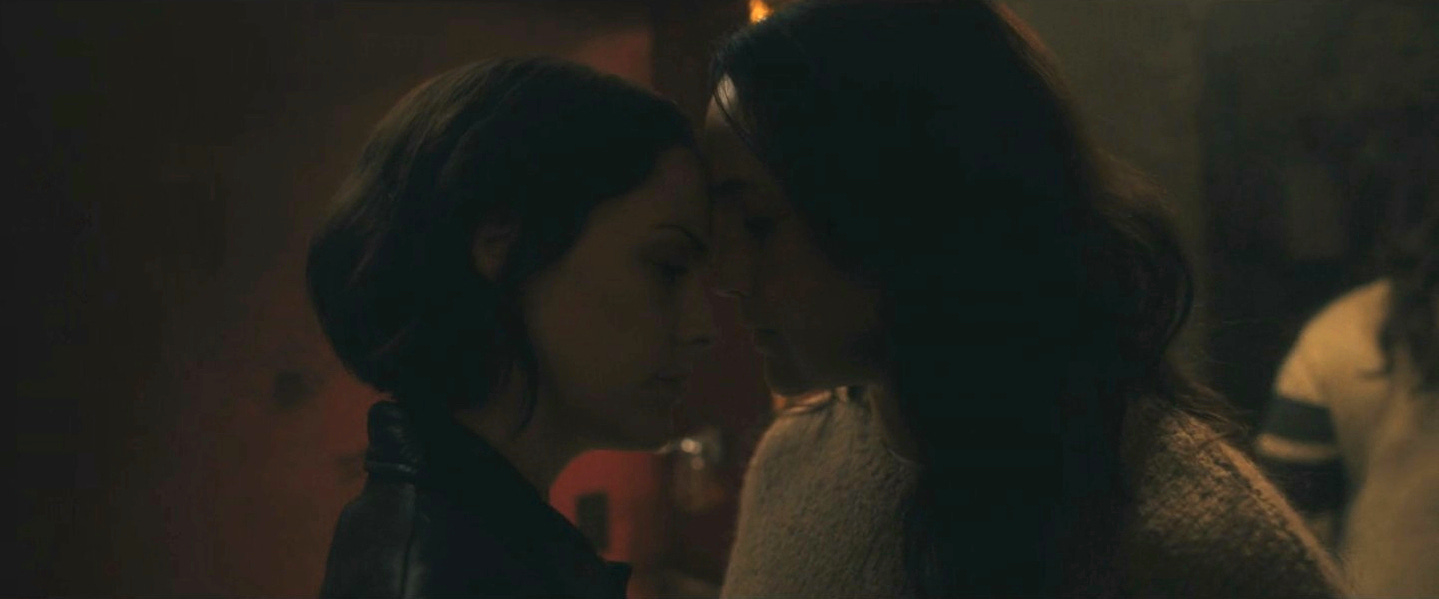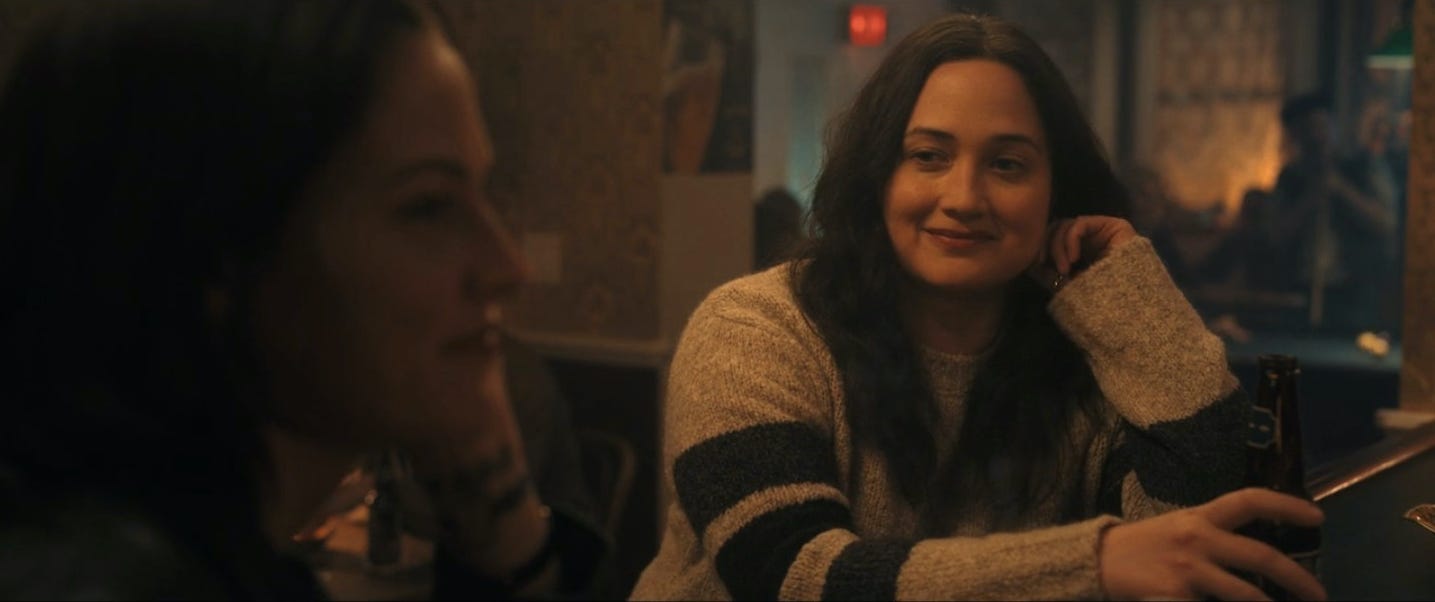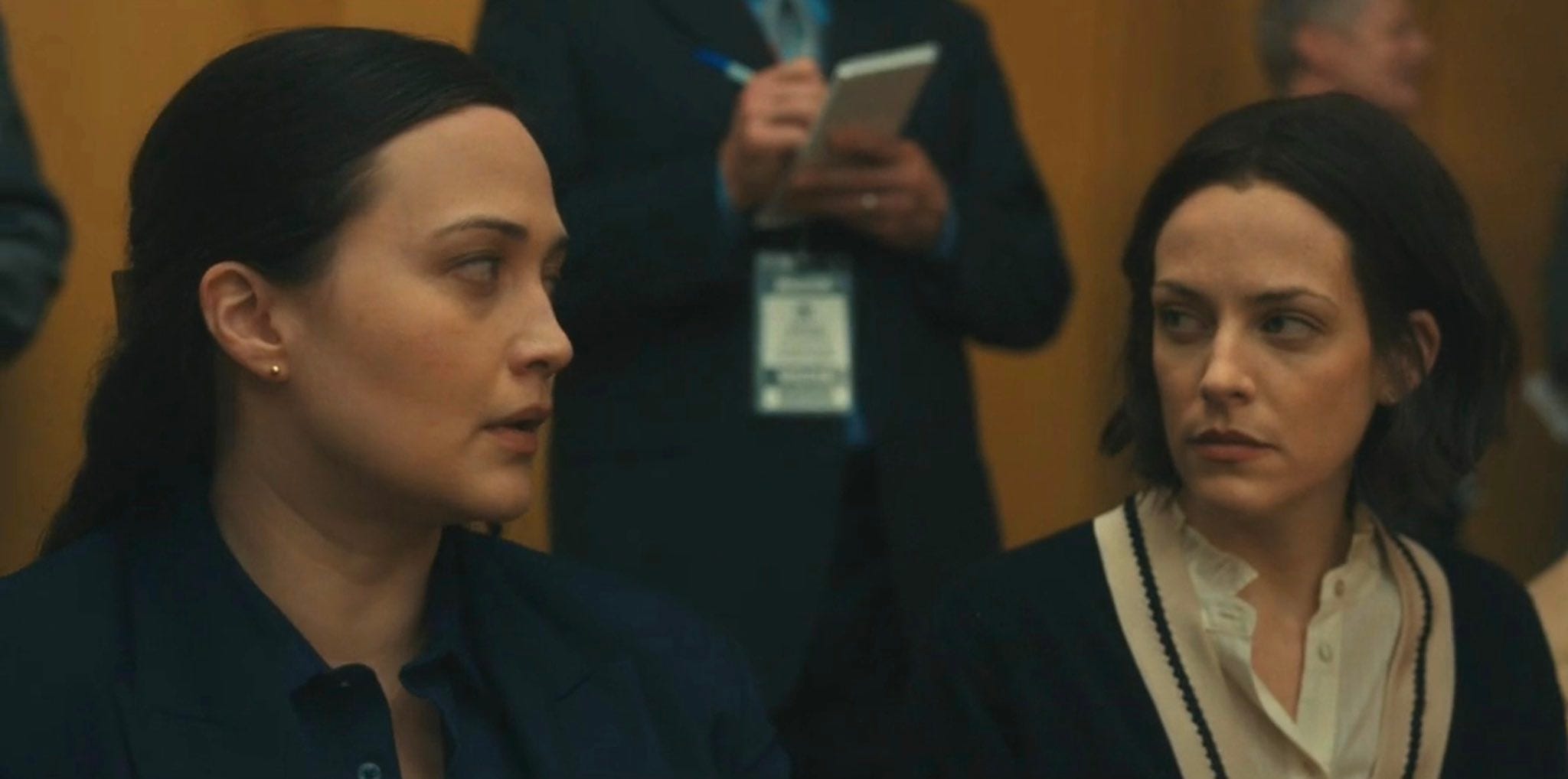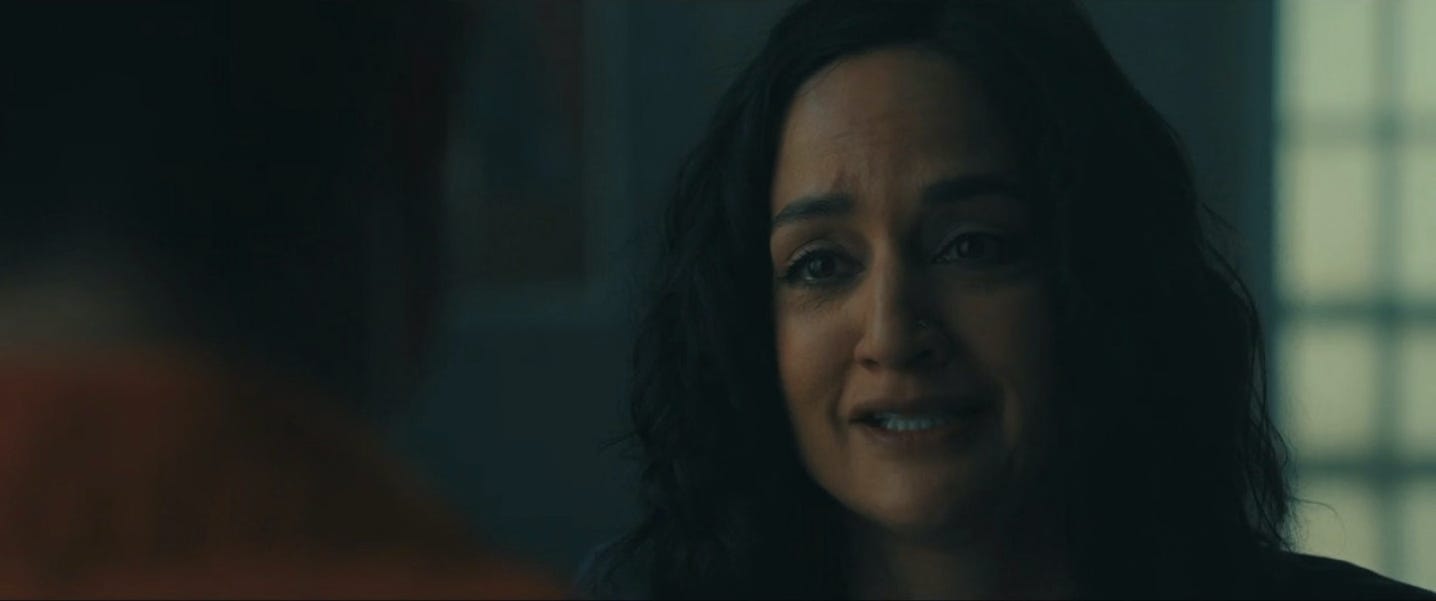Does 'Under the Bridge's Lesbian Love Affair Do Justice to the Story?
Does 'Under the Bridge's Lesbian Love Affair Do Justice to the Story?The answer has a lot do with Lily GladstoneThis is the Sunday Edition of Paging Dr. Lesbian. If you like this type of thing, subscribe, and share it with your friends. Upgrade your subscription for more, including weekly dispatches from the lesbian internet, monthly playlists, and a free sticker. [Some spoilers ahead.] If you’re a pop culture-obsessed sapphic who was on Twitter around April 24th, you may have witnessed firsthand the debut of this season’s hottest new lesbian couple. Lily Gladstone and Riley Keough play Cam and Rebecca, two characters on Hulu’s true crime series Under the Bridge. Childhood friends torn apart by a shared tragedy, Cam and Rebecca reunite while investigating the murder of a young girl – Cam as a cop, and Rebecca as a writer. The series is based on real events (though Cam is a fictionalized character), and there was no prior indication a lesbian love story would be a part of the narrative. Still, from the first moment they share the screen, Keough and Gladstone have white-hot chemistry, though it initially manifests itself through anger and hurt feelings. In episode three, Cam and Rebecca consummate their pent-up tension in a bar bathroom, and their rendezvous did not go unnoticed. Clips of the bathroom scene spread like wildfire online, and everyone was clamoring for more. Viewers – myself included – quickly pressed play on the first episode, desperate to immerse themselves in the story. And thus, a fandom was born. What makes this relationship – and the fan response – unique is the context in which it emerged. Under the Bridge tells the story of Reena Virk, a 14-year-old girl who was beaten and killed by her middle school peers in the island town of Victoria, Canada in 1997. Writer Rebecca Godfrey returns to her hometown to work on a book, only to find herself drawn to the horrific case and the troubled teens behind the violence. Cam Bentland works on the local police force alongside her father and brother. Adopted into a white family and with no knowledge of her true origins, Cam struggles to find her place. Reena is the heart of the story, and she is played with astonishing tenderness by the same-aged Vritika Gupta. The series works to illuminate and indict the circumstances that led to Reena’s death and the investigation that followed, from racism to the criminal justice system, while also critiquing the genre of true crime. At the same time, Cam and Rebecca’s dynamic is utterly captivating. As I dug into the show and became transfixed by the relationship, I found myself filled with questions. What does it mean that we, the fans, are obsessing over this couple in this context? Does their relationship pull focus away from Reena? For those of us who believe in abolition, how do we reconcile our attraction to or affection for Lily Gladstone’s cop character? Does the show indict us, as audience members, for having these reactions? As the series unfolds with nuance and compassion for its characters, answers slowly emerge. Cam and Rebecca’s dynamic operates on two levels. On the first level, their relationship is allegorical. Co-showrunner Quinn Shephard told IndieWire that the TV version of Rebecca Godfrey needed a “foil,” someone with an opposing perspective. While Rebecca is fascinated by and even identifies with some of the accused teens, Cam is horrified by their behavior, and by Rebecca’s too. They also represent the often opposing forces of law enforcement and journalism, which, as Gladstone notes, often see each other as the enemy. While Rebecca embodies and wields the dangerous allure of white girlhood and womanhood, initially connecting with Jo (Chloe Guidry), Cam aligns more with the outsider perspectives of Reena and Dusty (Aiyana Goodfellow). And yet, Cam and Rebecca are more than just archetypes. The series underscores the fact that every character (perhaps with one exception) is a human being deserving of mercy and empathy despite their actions, and that includes Cam and Rebecca. As Gladstone puts it, “They’re individuals with a very human experience that kind of overrides and steers the ship of the institutions or the entities they represent.” It may not seem like they’re always on the same team, though they’ve loved each other for half their lives. But is that enough? Rebecca can be a frustrating character, often acting in ways that hurt or at least perplex those around her. She is by no means the hero of the story. Cam is less frustrating to watch but is similarly frustrated, caught between her family and their sense of duty and her own moral compass. Despite all the complications that arise from it, their relationship and feelings for one another is the most true part of both of their lives. It’s not surprising that viewers latched on to the relationship, complex and angst-ridden as it is. In a heart-wrenching flashback that explores the death of Rebecca’s brother, we learn that they’ve had the same dynamic since they were kids – Rebecca the impulsive whirlwind and Cam the stable presence – and that they’ve loved each other since the beginning. On YouTube, you can find numerous fan videos full of yearning, and on Twitter, visionary vids set to Taylor Swift songs. On Archive of Our Own, the fanfics are plenty erotic but usually filled with a deep sense of angst as the characters reckon with trauma. Because their relationship isn’t the primary focus of the show, fans make do with analyzing every glance and touch, filling in the gaps of what we don’t see on screen. Yearning is, after all, a lesbian practice. What’s more, as one fan noted, Keough and Gladstone are perfect for the roles, as they are “the two most important onscreen yearners.” (Keough’s film Lovesong is perhaps the most quietly devastating lesbian film ever made, and Gladstone yearns magnificently in Certain Women.)¹ Gladstone’s performance in the show is enormously important and adds another layer to the fandom elements. Gladstone has garnered a devoted sapphic fanbase as of late, and it continues to grow as viewers discover they’ve played not one but three butch lesbians in their career so far. (They star opposite Kristen Stewart in Certain Women, and Fancy Dance premieres later this month.) Gladstone’s fans – often referred to as “Lily Gladstone nation” – are respectfully horny for the actor, celebrating their talent and intelligence as much as their beauty (though the latter topic is frequently a point of discussion online). In Under the Bridge, the physicality Gladstone brings to Cam is central to the character, and the nuances of the performance have not gone unnoticed by viewers. If you’re looking for sexy fancams depicting Cam and her butch swagger – you’ve got ‘em. Fans can’t get over the way Cam picks Rebecca up during the bar bathroom scene, nor the moment where Cam sits with her legs spread and looks up at Rebecca, telling her she doesn’t want to have dinner together but that she can come over afterward. The moments of softness and vulnerability are just as important. Fans love the scene where Cam meets Rebecca at the bar in a cream sweater with her hair down, or any time she’s out of her uniform and looks more relaxed. Still, there’s the question of whether these lustful reactions to Cam stem from her position of (oppressive) power as a cop. While there are certainly some out there who find the uniform erotic, Cam’s butchness, her “top energy,” if you will, isn’t inherently tied to her job. We learn in flashbacks that she’s always been masculine-of-center, and she’s certainly not going to give up her trusty truck once she leaves the force. I know I’m not the only fan of this show who’s been going to protests this year (and in years past) and seeing cops violently oppress those fighting for liberation, and I initially found it vexing that Cam stands out as one of the most sympathetic characters on the show. Much of that comes down to Gladstone’s quietly tragic performance. The pain in her eyes, what it’s costing her to live out the family legacy – it’s never far from the surface. As an indigenous lesbian cop, Cam embodies two overlapping TV archetypes that don’t exactly expand our worldview. In Knock LA, Drew Burnett Gregory explores the history of LGBTQ cops on TV, noting that this trend only upholds copaganda. In Variety, Gladstone addressed the trope of the indigenous woman cop, who they say is “almost the only role that we get to see.” Gladstone goes on to discuss Cam’s journey of shedding the cop mentality as well as the literal badge as the series goes on, noting that “The cop persona is an imposed one” – especially in Cam’s case. Speaking about how Cam’s character exists in part to criticize the criminal justice system, co-showrunner Quinn Shephard says, “We really did not want to make copaganda, and wanted, in fact, to have a character whose arc was realizing that the community she was raised in is complicit in violence.” Casting Gladstone as Cam does more than just assure that a great actor portrays the role – it also brings another voice into the conversation. In every interview for their work, whether it be Killers of the Flower Moon or Under the Bridge, Gladstone takes the time to teach the audience something about Native culture or history, using their recently elevated platform to be an advocate for their community. During press for Under the Bridge, Gladstone often brings up the Sixties Scoop, a program in Canada wherein authorities took indigenous children from their families – something Cam learns is a part of her own history. Gladstone has spoken at length about the importance of including an indigenous perspective in the show considering the epidemic of missing and murdered indigenous women, also noting the fact that Native communities tend to be at the forefront of restorative justice moments. Though these themes are at least implicitly present within the show, Gladstone’s – as well as the rest of the cast and crew’s – metatextual commentary adds another layer of resonance. Ultimately, the questions I was troubled by in the first half of the series fell away as all the characters struggle to find a way out of their pain in the latter half. It’s true that the show indicts both Rebecca’s position as a writer and Cam’s position as a cop, but as people, they are both shown mercy and given the chance to try and evolve. That’s the deal, really – the series suggests that everyone deserves a chance at redemption, even if these oppressive systems don’t make that easy. On the one hand, Cam and Rebecca’s seemingly irreconcilable differences amplify the broader tragedy of the story. A cynic might conclude that love can’t conquer all – these social structures and institutions are just too powerful. But that’s not quite right. Love can’t change the past or heal old wounds, but it can propel us forward. We see that in Cam and Rebecca’s relationship, which reminds them what it feels like to really feel alive and be seen, and in Reena’s parents’ turn towards restorative justice and anti-bullying advocacy following their daughter’s death. It’s tempting to imagine a potentially hopeful future for Cam and Rebecca as they start on paths toward healing, even if that future is not together (though we can certainly dream – and write – that part up). But does Reena’s story get the attention it deserves? For the most part, yes. The show is so compelling and well-rounded that every scene becomes the most important scene in that moment. When Cam and Rebecca are on screen, it’s easy to forget about the other characters, but the reverse is true when the teens or Reena’s parents appear. Archie Panjabi, playing Reena’s mother, Suman, delivers some of the most critical and gut-wrenching scenes in the final two episodes, calling out Rebecca for not caring about Reena’s story and showing Warren (Javon Walton) the ultimate mercy. When Panjabi occupies the frame, whatever preoccupations fans previously had about Cam and Rebecca’s interpersonal issues fall away. As it concludes with a breathtaking final scene, the show reminds us that the ultimate tragedy is Reena’s death – not these two women’s opposing views and inability to move on. Rather than distracting from the central story, our investment in Cam and Rebecca’s relationship makes the critique of these systems even stronger. We can hold space for Reena’s story while also rooting for Cam and Rebecca to come together. Indeed, their relationship illuminates the humanity of both characters outside of their social positions. This follows the show’s main intervention, which is to highlight the singularity of everyone involved while also critiquing how social systems and institutions stamp down humanity and make people like Reena – and her attackers – more vulnerable. To be sure, it shouldn’t take a sexy, star-crossed lesbian romance to get viewers to care about marginalized folks and their stories. We shouldn’t have to identify with characters on screen to be empathetic towards them. But as a holistic piece, Under the Bridge succeeds in encouraging the viewer to feel for and with every character. Each individual represents a larger issue, yet they all have soul and specificity, operating on two levels that invite both emotional investment and personal reflection. The show doesn’t indict Cam and Rebecca’s fans for rooting for their relationship, but we’re not totally off the hook, either. We’re all implicated in society’s fascination with true crime and the way we eat up tragedy like candy, just as the show implicates itself in this critique through the character of Rebecca. To yearn is to be human, and that is certainly a part of Cam and Rebecca’s appeal for fans. But what does yearning produce? The best a show like this can do is encourage us to imagine that a better world is possible, one in which these characters, and yes, these real people, have a chance at truly living. 1 Fans also love the IRL dynamic between Keough and Gladstone, especially this interview with Emmy Magazine where they discuss the love scene. You’re a free subscriber to Paging Dr. Lesbian. For the full experience, which includes weekly dispatches from the lesbian internet, become a paying subscriber. Your support means a lot! |
Older messages
Top Chef is Still the Most Lesbian Reality Show on TV
Monday, June 3, 2024
Knives out, gay people 🔪 ͏ ͏ ͏ ͏ ͏ ͏ ͏ ͏ ͏ ͏ ͏ ͏ ͏ ͏ ͏ ͏ ͏ ͏ ͏ ͏ ͏ ͏ ͏ ͏ ͏ ͏ ͏ ͏ ͏ ͏ ͏ ͏ ͏ ͏ ͏ ͏ ͏ ͏ ͏ ͏ ͏ ͏ ͏ ͏ ͏ ͏ ͏ ͏ ͏ ͏ ͏ ͏ ͏ ͏ ͏ ͏ ͏ ͏ ͏ ͏ ͏ ͏ ͏ ͏ ͏ ͏ ͏ ͏ ͏ ͏ ͏ ͏ ͏ ͏ ͏ ͏ ͏ ͏ ͏ ͏ ͏ ͏ ͏ ͏ ͏ ͏ ͏ ͏
June Thomas on 'A Place of Our Own: Six Spaces That Shaped Queer Women's Culture'
Monday, June 3, 2024
A conversation about space and community ͏ ͏ ͏ ͏ ͏ ͏ ͏ ͏ ͏ ͏ ͏ ͏ ͏ ͏ ͏ ͏ ͏ ͏ ͏ ͏ ͏ ͏ ͏ ͏ ͏ ͏ ͏ ͏ ͏ ͏ ͏ ͏ ͏ ͏ ͏ ͏ ͏ ͏ ͏ ͏ ͏ ͏ ͏ ͏ ͏ ͏ ͏ ͏ ͏ ͏ ͏ ͏ ͏ ͏ ͏ ͏ ͏ ͏ ͏ ͏ ͏ ͏ ͏ ͏ ͏ ͏ ͏ ͏ ͏ ͏ ͏ ͏ ͏ ͏ ͏ ͏ ͏ ͏ ͏ ͏
Is ‘The Idea of You’ the First Good Fanfic Movie?
Sunday, May 19, 2024
Even if it's not really about Harry Styles, fanfic is a state of mind ͏ ͏ ͏ ͏ ͏ ͏ ͏ ͏ ͏ ͏ ͏ ͏ ͏ ͏ ͏ ͏ ͏ ͏ ͏ ͏ ͏ ͏ ͏ ͏ ͏ ͏ ͏ ͏ ͏ ͏ ͏ ͏ ͏ ͏ ͏ ͏ ͏ ͏ ͏ ͏ ͏ ͏ ͏ ͏ ͏ ͏ ͏ ͏ ͏ ͏ ͏ ͏ ͏ ͏ ͏ ͏ ͏ ͏ ͏ ͏ ͏ ͏ ͏ ͏
Are Lesbians on TV Still Disappearing?
Sunday, May 12, 2024
Dr. Lesbian considers the GLAAD report ͏ ͏ ͏ ͏ ͏ ͏ ͏ ͏ ͏ ͏ ͏ ͏ ͏ ͏ ͏ ͏ ͏ ͏ ͏ ͏ ͏ ͏ ͏ ͏ ͏ ͏ ͏ ͏ ͏ ͏ ͏ ͏ ͏ ͏ ͏ ͏ ͏ ͏ ͏ ͏ ͏ ͏ ͏ ͏ ͏ ͏ ͏ ͏ ͏ ͏ ͏ ͏ ͏ ͏ ͏ ͏ ͏ ͏ ͏ ͏ ͏ ͏ ͏ ͏ ͏ ͏ ͏ ͏ ͏ ͏ ͏ ͏ ͏ ͏ ͏ ͏ ͏ ͏ ͏ ͏ ͏
the dissonance intensifies
Wednesday, May 8, 2024
are we in a dystopian YA novel or something? ͏ ͏ ͏ ͏ ͏ ͏ ͏ ͏ ͏ ͏ ͏ ͏ ͏ ͏ ͏ ͏ ͏ ͏ ͏ ͏ ͏ ͏ ͏ ͏ ͏ ͏ ͏ ͏ ͏ ͏ ͏ ͏ ͏ ͏ ͏ ͏ ͏ ͏ ͏ ͏ ͏ ͏ ͏ ͏ ͏ ͏ ͏ ͏ ͏ ͏ ͏ ͏ ͏ ͏ ͏ ͏ ͏ ͏ ͏ ͏ ͏ ͏ ͏ ͏ ͏ ͏ ͏ ͏ ͏ ͏ ͏ ͏ ͏ ͏ ͏ ͏ ͏ ͏
You Might Also Like
Kendall Jenner's Sheer Oscars After-Party Gown Stole The Night
Tuesday, March 4, 2025
A perfect risqué fashion moment. The Zoe Report Daily The Zoe Report 3.3.2025 Now that award show season has come to an end, it's time to look back at the red carpet trends, especially from last
The FDA Just Issued a Recall on a Supplement — Because it Contains an ED Drug
Monday, March 3, 2025
View in Browser Men's Health SHOP MVP EXCLUSIVES SUBSCRIBE The FDA Just Issued a Recall on a Supplement — Because It Contains an ED Drug The FDA Just Issued a Recall on a Supplement — Because It
10 Ways You're Damaging Your House Without Realizing It
Monday, March 3, 2025
Lenovo Is Showing off Quirky Laptop Prototypes. Don't cause trouble for yourself. Not displaying correctly? View this newsletter online. TODAY'S FEATURED STORY 10 Ways You're Damaging Your
There Is Only One Aimee Lou Wood
Monday, March 3, 2025
Today in style, self, culture, and power. The Cut March 3, 2025 ENCOUNTER There Is Only One Aimee Lou Wood A Sex Education fan favorite, she's now breaking into Hollywood on The White Lotus. Get
Kylie's Bedazzled Bra, Doja Cat's Diamond Naked Dress, & Other Oscars Looks
Monday, March 3, 2025
Plus, meet the women choosing petty revenge, your daily horoscope, and more. Mar. 3, 2025 Bustle Daily Rise Above? These Proudly Petty Women Would Rather Fight Back PAYBACK Rise Above? These Proudly
The World’s 50 Best Restaurants is launching a new list
Monday, March 3, 2025
A gunman opened fire into an NYC bar
Solidarity Or Generational Theft?
Monday, March 3, 2025
How should housing folks think about helping seniors stay in their communities? ͏ ͏ ͏ ͏ ͏ ͏ ͏ ͏ ͏ ͏ ͏ ͏ ͏ ͏ ͏ ͏ ͏ ͏ ͏ ͏ ͏ ͏ ͏ ͏ ͏ ͏ ͏ ͏ ͏ ͏ ͏ ͏ ͏ ͏ ͏ ͏ ͏ ͏ ͏ ͏ ͏ ͏ ͏ ͏ ͏ ͏ ͏ ͏ ͏ ͏ ͏ ͏ ͏ ͏ ͏ ͏ ͏ ͏ ͏ ͏ ͏
The Banality of Elon Musk
Monday, March 3, 2025
Or, the world we get when we reward thoughtlessness ͏ ͏ ͏ ͏ ͏ ͏ ͏ ͏ ͏ ͏ ͏ ͏ ͏ ͏ ͏ ͏ ͏ ͏ ͏ ͏ ͏ ͏ ͏ ͏ ͏ ͏ ͏ ͏ ͏ ͏ ͏ ͏ ͏ ͏ ͏ ͏ ͏ ͏ ͏ ͏ ͏ ͏ ͏ ͏ ͏ ͏ ͏ ͏ ͏ ͏ ͏ ͏ ͏ ͏ ͏ ͏ ͏ ͏ ͏ ͏ ͏ ͏ ͏ ͏ ͏ ͏ ͏ ͏ ͏ ͏ ͏ ͏ ͏ ͏ ͏
“In life I’m no longer capable of love,” by Diane Seuss
Monday, March 3, 2025
of that old feeling of being / in love, such a rusty / feeling, ͏ ͏ ͏ ͏ ͏ ͏ ͏ ͏ ͏ ͏ ͏ ͏ ͏ ͏ ͏ ͏ ͏ ͏ ͏ ͏ ͏ ͏ ͏ ͏ ͏ ͏ ͏ ͏ ͏ ͏ ͏ ͏ ͏ ͏ ͏
Your dishwasher isn’t a magician
Monday, March 3, 2025
— Check out what we Skimm'd for you today March 3, 2025 Subscribe Read in browser Together with brad's deals But first: 10 Amazon Prime benefits you may not know about Update location or View

